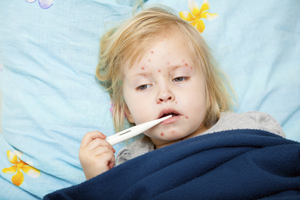
Please note: This article is meant to address some common questions and concerns about vaccinations in general. It is not meant to replace discussion with, or the advice of, your own family GP.
As a parent we would do anything in our power to protect our children, and for me this absolutely extends to immunisation. Immunisation is one of the most important public health developments of the last century and has led to a huge reduction in hospitalisations, long-term complications and death from many very serious diseases. Over 3 million lives each year are saved worldwide through immunisation.
Ironically, it is because of the success of our immunisation programs that a lot of people question the necessity and/or safety of immunising their children. Our current generation of parents (me included) has grown up not seeing (or very rarely seeing) diseases like measles, diphtheria and polio. We fortunately haven’t seen a child paralysed by polio, nor have we seen brain damage from measles for example. Because of the low incidence of these diseases (and hence lack of our awareness of just how serious and deadly they can be) this calls into question the safety of immunisations. We hear no stories of death/disability from certain infectious diseases but we do hear of (usually mild) side effects from immunisations.
Herd immunity
One of the common statements I hear is “well, this disease isn’t really around anymore so my child should be ok” and to some extent that is true thanks to something known as “herd immunity”. Although ironically relying on this to protect your child relies on most parents making the opposite decision to you and immunising their children. When enough of the community are immunised we tend to see the disease “die out”due to the lack of hosts to spread the disease around, and hence even those unimmunised are protected. A few points I would make about this:
- Herd immunity requires a certain (large) percentage of the population to be immunised. If everyone relies on this, our immunisation rates drop and herd immunity is no more, so we see resurgence of disease
- The beauty of herd immunity is our ability to protect vulnerable members of the community who are unable to be immunised – for example children with cancers such as leukaemia, and very newborn babies. So for every person who elects not to immunise their child thus reducing immunisation rates some of these vulnerable members of society are placed at risk.
- Because of relatively low immunisation rates in many parts of Australia some diseases (measles is a good example) are breaking out. If you are unimmunised, you are at risk – it’s that simple.
- In Australia some diseases are rare however such high levels of immunity do not necessarily exist in other countries so those traveling are at risk if unimmunised.
Immunisation safety
There are so many concerns out there about immunisations and/or myths about their safety – here is a selection of some of the common questions/concerns related to immunisation:
Firstly, how do immunisations work?
The principle behind immunisation is stimulating the body’s own natural immunity. Every time we are exposed to a disease our body makes “antibodies” to help fight and kill the disease. The next time we are exposed to the same bug, our body “remembers” it as those antibodies are already hanging around ready to go, so we are able to fight off the disease more quickly and effectively before it makes us sick.
Immunisations make our body think we have been exposed to various diseases (by presenting our immune system with very small amounts of killed/partial viruses/bacteria/toxins). In doing so, our immune system’s response is to produce these infection-fighting antibodies so that if we ever do come in contact with the actual disease our body is pre-prepared and ready to fight that disease before it takes hold.
Can immunisation cause disease?
To cause disease, viruses or bacteria multiply in our bodies – those used in vaccines are modified so that they cannot cause disease because they cannot do this. They are usually either killed or only part of the virus/bacteria/toxin is used – enough so that our body recognises the disease and mounts an immune response but without causing that disease.
How safe are immunisations and what are the side effects?
Nothing we put in our body is 100% safe!! Immunisations are generally associated with only minor side effects such as small localized swelling /redness/discomfort, tiredness, irritability or low grade fever. Very uncommon but more serious are some rare side effects including:
-Anaphylaxis (a life-threatening allergic reaction) – usually occurs quickly and one of the reasons why you are usually asked to wait a little while with your child after their needle (so we can treat it should this occur) (less than one in one million immunisations)
-Hypotonic hyporesposive episodes (where baby goes pale, floppy and is unresponsive) – resolve themselves and do not cause any long-term harm
-Febrile convulsion (a seizure associated with a fever that occurs in about 3% of healthy children at some point regardless of immunisations)
-Intussusception with the rotavirus vaccine (where the bowel blocks up because part of it telescopes into itself) – up to six extra cases in Australia for every one hundred thousand immunised.
Do vaccines overwhelm my baby’s immune system?
Healthy people have the ability to mount an immune response to any infection. Immunisations do not weaken the immune system – in fact they strengthen it by stimulating it to provide protection against many diseases. Remember, even babies are challenging their immune system every day with lots of new germs – in the air, from everyone who holds them, in their food etc.
If giving lots of immunisations together did overwhelm the immune system, you would expect a poor immune response to those diseases where multiple vaccines are given at once (almost all of the childhood immunisations). This is clearly not the case as we have seen the huge reduction in all of the diseases with immunisations available. The immunisations that are combined together have been rigorously studied to ensure that the body generates an adequate response to all components when given together, but also to ensure that there are no negative effects associated with giving them together.
The advantages of combining vaccines are that it reduces doctor visits/needles and we get our children protected much more quickly against all diseases.
Why do some immunised people still get the disease they were immunised against?
Unfortunately vaccines are not 100% effective but still provide a very high level of protection. For example, the MMR vaccine offers about 95% protection. The whooping cough vaccine probably offers around 85%. We often see that children who catch diseases after immunisation (e.g. chicken pox or whooping cough) get milder symptoms.
Some vaccines also require a “booster” dose because immunity can reduce over time. Whooping cough (pertussis) is a good example of this – although we are immunised as children, we get boosters as teenagers (currently year 10) and then often when we become parents to ensure we maintain high levels of immunity.
Can my child still be immunised if they are sick?
It depends. If your child only has a minor illness like a cold and has no temperature there is no reason why they cannot be immunised. Really the only problem may be if they are more unwell the following day/have a temperature we wonder if it is a side effect of the vaccine or their illness getting worse. As always though, if in doubt, see your doctor for a check.
I haven’t immunised my child up to now, have they missed the boat?
No! Although there are a few vaccines that can only be given at certain ages (e.g. rotavirus) most children (and adults) at any age can follow a “catch up” schedule to ensure they receive all necessary immunisations.
Do vaccines contain metals like mercury or aluminium?
Thiomersal is a mercury-based preservative that has been used in some vaccines to prevent bacteria/fungal contamination. This is a form of mercury that doesn’t actually accumulate in the body – it is passed out in the stool. Although there is no evidence that this causes any long-term effects, it was removed from childhood immunisations as of the year 2000 as a precautionary measure to completely eliminate any theoretical risk. Note that we have more mercury exposure in our diet anyway (e.g. seafood).
Some vaccines also have aluminium salts in very small amounts (they enhance the immune response). These have been shown to be safe and this exposes us to far less aluminium than we receive in our diet or in some medications like antacids.
Does the MMR vaccine cause autism or inflammatory bowel disease?
A study published in 1998 raised the possibility of a link between autism, inflammatory bowel disease and measles/mumps/rubella vaccine. This study has since been retracted by the journal that published it (as well as by 10 of the 13 authors) after investigation into the original data has shown to be fraudulent. The main author has also since been deregistered from practicing medicine in the UK. Since this study over 20 large studies have been conducted in countries such as the UK/Scandinavia/US/France and no link has been found. The World Health Organisation also conducted a review that concluded there was no link. Unfortunately this study, although isolated in its finding, has harmed the reputation of a very effective and safe vaccination.
Here is an excellent video clip that summarises the entire history of the research into the supposed link between Autism and the MMR vaccine:
What about homeopathic immunisations?
There are no high quality unbiased studies that demonstrate the effectiveness of homeopathic vaccines. Conventional immunisations on the other hand are highly scrutinised, tested and followed up to ensure they are safe and effective. Both the Australian and British Register of Homeopaths actually recommend that those receiving homeopathic immunisations should also receive conventional immunisation.
Why do doctors (myself included) support immunisations?
Our immunisations have a long safety and success record. Doctors support immunisation because of these reasons. We know that all of our available vaccines have undergone rigorous testing for efficacy and safety (in fact this monitoring continues on all our currently used vaccines). We DO NOT receive any “kickbacks” from drug/vaccine companies – we recommend vaccines because they work and they are safe. I would never do anything to put my child at risk and would do anything I could to protect him – hence it is without any reservation that I have him fully immunised.
Where did my information come from and where can you find out more?
Below are the sources I used. They are all excellent booklets or summaries of immunisations, common questions, myths and the diseases we protect against.
Immunise Australia Website – various fact sheets available
https://immunisationhandbook.health.gov.au/
National Centre for Immunisation Research & Surveillance (NCIRS) website (various factsheets accessible via following link)
http://ncirs.edu.au/immunisation/fact-sheets/index.php













